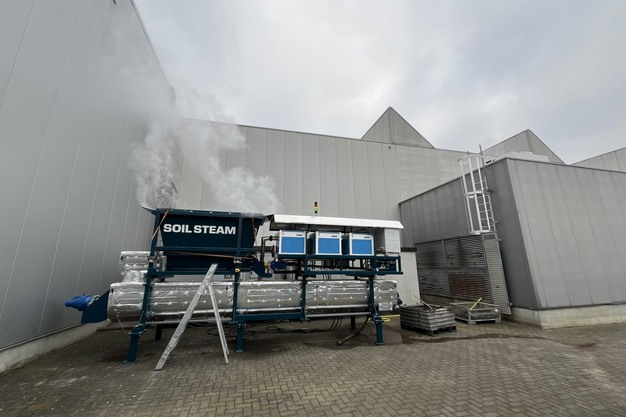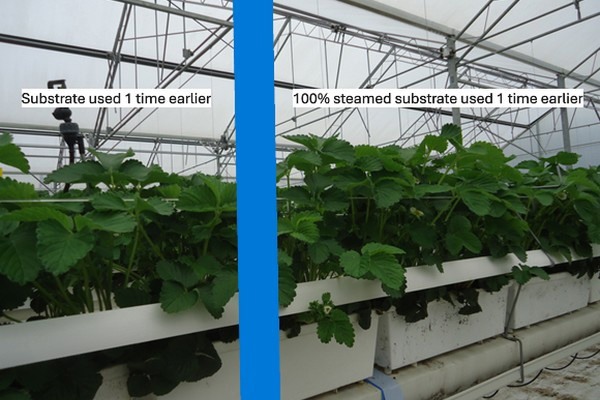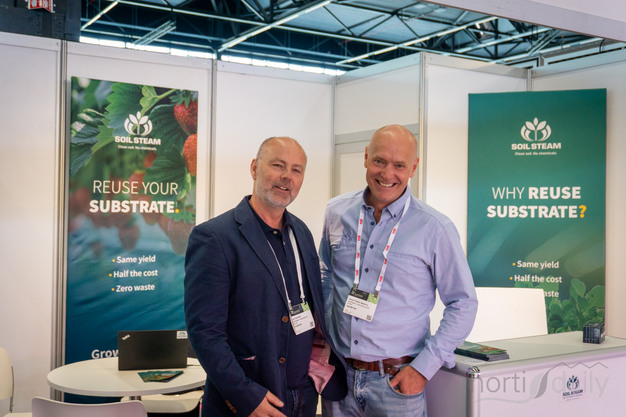Hans Kristian Westrum, Founder and Chief Growth Officer of Soil Steam and his company, is spearheading a promising shift in how growers treat and reuse substrates.
For years, Soil Steam has specialized in high-temperature treatments that eliminate pathogens from soil. However, in recent months, Hans and his team have been testing whether the same approach can be applied to substrates as an essential growing medium.
"We have the technology, and we've proven it can sterilize substrates to a point where they can be reused safely and effectively," he explains.
 © Soil Steam
© Soil Steam
Groundbreaking trials at Hoogstraten
To test this concept, Soil Steam collaborated with Peter Melis and the team at Proefcentrum Hoogstraten, a leading strawberry research center in Belgium. Together, they initiated a comprehensive trial to compare fresh substrate with steamed, recycled substrate across various blends.
"We went down and steamed about 10 cubic meters of used substrate. Then Hoogstraten created mixes - some 100% recycled, some 100% fresh, and others blends like 40/60 - and planted strawberries," Hans recounts. "Of course, we hoped for parity with fresh substrate, but honestly, the team at Hoogstraten thought that was too good to be true."
The early results, however, told a different story.
"Preliminary data shows the recycled substrate is performing just as well," he shares with cautious optimism. "Strawberry growers who visited the site have seen the trials and are already excited. We expect the final report by the end of this month."
 © Soil Steam
© Soil Steam
Expanding the scope: A larger research initiative
Given the encouraging results from Hoogstraten, Soil Steam is now planning a more extensive, multi-year research program that builds on this success. Crucially, Proefcentrum Hoogstraten will remain an integral partner in this next phase of development.
"We want to scale this up and dig deeper into the science," says Hans. "Hoogstraten will continue to play a central role, but now we're also bringing in NIBIO in Norway and Wageningen University in the Netherlands to expand the scope and credibility of the research."
The expanded program will investigate a broader range of variables, including long-term substrate performance, pathogen resilience, and how many cycles of reuse are feasible without compromising quality.
Bridging science and commercialization
"Our company culture is deeply rooted in combining research with product development. This isn't just a one-off trial," Hans emphasizes. "This collaborative network with leading research institutions is critical for refining our process and helping the industry adopt substrate recycling at scale."
Despite the ongoing research, commercial rollout is already in motion. "Some growers don't want to wait - they want the machines now," he notes. "We're taking orders and preparing to deliver machines tailored for strawberry production as early as next year."
Custom solutions for a diverse market
Recognizing that one size doesn't fit all, Soil Steam offers three machine sizes to accommodate farms of various scales.
"We have a small unit processing 1–2 cubic meters per hour, a medium one handling 5–7, and a large unit up to 30 cubic meters per hour," Hans explains. "Some growers want their own machines, but for others, it may make more sense for substrate providers to offer a centralized steaming service."
He outlines an ideal model: "You drive in with used substrate, and drive out with a recycled blend, ready to go. Providers already know about mixing materials - why not include steaming in their offerings?"
 © Arlette Sijmonsma | MMJDaily.com
© Arlette Sijmonsma | MMJDaily.com
Ken Roar Rils and Hans Kristian Westrum, Soil Steam at Greentech Amsterdam 2025
Practical applications, globally
Drying the substrate before steaming is key to energy efficiency. He points out, "All we ask is that growers stop irrigating a week before. By the time we arrive, the substrate is already dry, making the process faster and cheaper."
And the potential goes beyond strawberries. "We've seen successful results with cucumbers, tomatoes, peppers, even blueberries," he adds. "We believe our system will work for any dry, shredded substrate."
This flexibility makes the system especially attractive for growers facing global supply chain challenges.
"During the pandemic, growers in the U.S. and Canada couldn't get fresh substrate. Now, they're telling us they want to be self-sufficient. If they can treat substrate on-site, they're no longer vulnerable to delays or quality issues."
Sustainability that scales
As regulations tighten and the horticultural industry faces increasing scrutiny over waste and resource use, Soil Steam's solution arrives at a critical time.
"Substrate providers are under pressure to improve their life-cycle impact," Hans states. "There's a growing awareness that you can't just dump used material anymore."
Even fresh substrates, he notes, can contain unwanted seeds or pathogens. "Imagine buying fresh substrate, and it's already contaminated. With our technology, you can sterilize everything before planting, whether it's reused or brand new."
He adds, "We envision a future where providers offer 70% recycled substrate, 30% new. The mix is safe, high-quality, and far more sustainable."
A circular future for horticulture
Hans is optimistic about adoption: "We've had strong signals from several major substrate suppliers. They see the value, not just in product quality, but in service. Imagine if they say, 'We'll deliver your new substrate and take back the old.' That's a complete circular system."
It's a vision that resonates with today's growers, especially those facing environmental scrutiny and economic uncertainty.
For more information:
Hans Kristian Westrum
Sales Manager at SoilSteam
Email: [email protected]
Phone: +47 4040 2090
Strawberry Research at Proefcentrum Hoogstraten
Peter Melis
Email: [email protected]
Phone: +32 3315 7052










